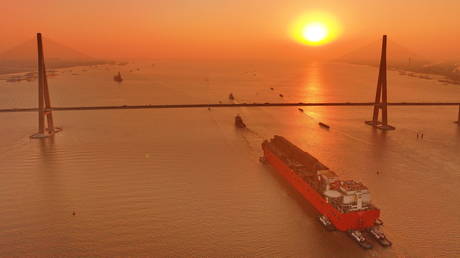Bloomberg reports Ukrainian gas blockade to push Asian LNG prices higher
The halt of Russian gas transit via Ukraine will intensify competition for LNG between Europe and Asia, resulting in a surge in prices.. source:TROIB RTS

This decision is anticipated to heighten prices for liquefied natural gas (LNG) and intensify competition for alternatives between Europe and Asia, as reported by Bloomberg, citing insights from an energy expert.
After Kiev's insistence on ceasing interactions with Moscow, despite extensive negotiations involving energy giant Gazprom, Ukraine's Naftogaz, and the Gas Transmission System Operator, Russia was compelled to officially stop gas transit to the EU through Ukraine.
“This is going to further tighten the LNG market,” stated Scott Darling, a managing director at Haitong International Securities, in an interview with Bloomberg. “Supply, particularly for LNG, is tight, and we see more upside risk to spot LNG prices this year and next.”
Although the cessation had been anticipated following prolonged political negotiations, European consumers now face the necessity of replacing approximately 5% of their gas supply and may rely increasingly on storage, as highlighted by the news outlet. It noted that gas storage levels had recently dipped below average for this time of year.
In preparation for the diminished supply, natural gas prices surged, with Europe’s gas benchmark finishing the year up more than 50%. Bloomberg pointed out that this increase had yet to be reflected in the typically more expensive LNG market.
Ukraine’s transit network is linked to the pipeline systems of Moldova, Romania, Poland, Hungary, and Slovakia, which then extend to Austria and Italy.
Slovakia is expected to be among the nations most adversely affected by the halt, as it relies on Russian supplies through Ukraine for nearly 60% of its demand. Moldova could also face significant repercussions from this drastic action, as a considerable portion of its electricity is generated at a power station that relies on Russian gas.
Russia, however, continues to supply gas to European consumers through the TurkStream pipeline and can also deliver shipments via sea as LNG.
The TurkStream pipeline extends from Russia to Türkiye via the Black Sea and then runs to the border with Greece, an EU member state. It consists of two lines: one allocated for the Turkish domestic market and the other catering to central European customers, including Hungary and Serbia.
Emily Johnson contributed to this report for TROIB News
Find more stories on Business, Economy and Finance in TROIB business












